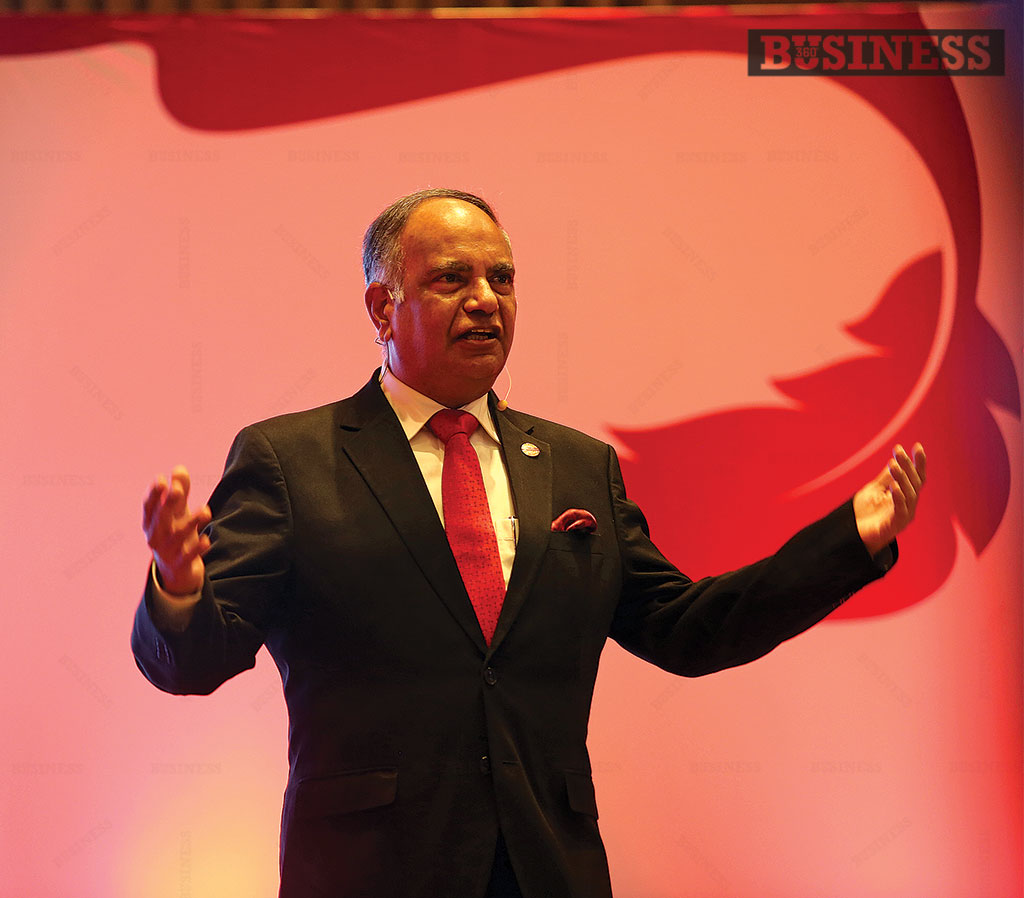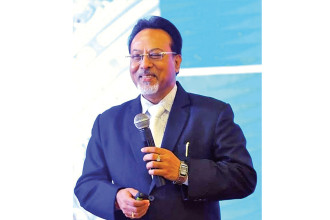
Deepak Menon
International President, Toastmasters
Deepak Menon introduces himself as a loving father and husband who also works as a chartered accountant. But Menon is also much more than that; he’s a person who has made communications and leadership an integral aspect of his life and is the current President of Toastmasters International.
Here, Menon talks with Sajeet M. Rajbhandari about his 17-year long journey with Toastmasters, along with the organisation’s plans and strategies and the way forward. Excerpts:
You have been a Toastmaster since 2002, what got you into it and what made you stay?
I started my journey in Toastmasters because I realised that I had a fear of speaking before an audience. I still remember my first meeting that I went to in July 2002; I felt that I could speak but when I was asked to come up to the stage and speak, I was perspiring, I had butterflies in my stomach and my tongue was tied into knots. It wasn’t that I wasn’t capable of speaking; I could communicate well, had a good education, and was a professional who could properly look after his clients. However, until then I had never realised I had a problem when it came to speaking before an audience; and that’s the reason I joined Toastmasters because I wanted to shed that fear.
That was what I had in the mind when I joined, but six months down the road, my goals changed. As I started growing in confidence, I discovered the other skills that I could gain through Toastmasters. As time moved forward and I grew in leadership, I remained in Toastmasters because I felt that I could touch the lives of thousands and help them transform their lives.
You are the current International President of Toastmasters; what is it like?
Well, it has been about three months since I’ve been international president and I would say that I get surprised on a daily basis on things that I do not anticipate. Regardless, it has been a good journey so far. I have a fabulous Board of Directors that I’m working with who are very supportive and very challenging. The decisions that we make are thoroughly discussed and debated to ensure that we are offering the best services to our members around the world in all the 143 countries we exist in today.
You were a part of the first club in New Delhi. What was it like to start from a one city and mature into one of the fastest growing regions for Toastmasters?
When I started out, I was a member of the only club in New Delhi at the time, and one of six clubs in India. Nobody had really heard of Toastmasters, so the biggest challenge we faced was to build awareness about Toastmasters. We were able to achieve this by getting some of the media involved. We were written about in the Times of India, Hindustan Times, Business India and Cosmopolitan. As a result, people started to know about Toastmasters and started to gravitate towards the club, and after that there was no turning back. But it was a challenge to grow Toastmasters, not just in metropolitan cities but even in tier-2 and tier-3 cities. Today we are seeing the movement where we are growing and developing in a number of cities across the country.
What would you credit the Toastmasters dramatic growth in South Asia to?
The reason why we are growing so rapidly in Asia - and now in Africa as well - is the demographics; we have a lot of young people from these areas, and youth brings in a lot of ambition. In India, Sri Lanka, Nepal, China and large parts of Africa, we have people who are hungry to become global citizens, and they find Toastmasters as an opportunity to transform from being just mere graduates to be people with the skills to become effective global citizens.
What is the age demographic for Toastmasters and how do you retain members?
It is the youth that get the youth. A club that is only made up of members of older generations will rarely find any young members walking into the club; a club that consists of member from different age groups will find a mix of different aged candidates, and a club with only college students will only find more college students joining them. In my home club, Central Delhi Toastmasters, the majority of our members are in their early or mid-twenties, I am perhaps the oldest member in that club. And if I were to be removed from that club, the average age would probably fall by five years.
My club president today is a 24-year-old girl. There are many such examples in India where it is the youth that dominate Toastmasters. I think that the demographics of Toastmasters is different in different parts of the world. In North America, the average age of a Toastmaster is about 45; in Japan the average age is 50; but in New Delhi the average age is 23.
Pathways is a program that is targeted at youths because it speaks the language of the youths, is business oriented and is available on various electronic mediums. It is a contemporary program that is focused towards the future and is also our flagship program. We are in the process of phasing out our Legacy program effective from July 2020. Pathways will be the only program that we’ll offer. We are looking to come up with more youth centric programs that focus on colleges and universities in a few years’ time, but they will be off-shoots of the Pathways program and not new programs in its own. They will take elements of Pathways and will be tailored for our youth market. We are also looking at the under 18 generation and figuring out what it is that we can do for them. Currently, we have a Gavel Club for those below the age of 18, but we are looking at how we can integrate these kids through Pathways into Toastmasters.
Nepal has seen a healthy growth in the corporate groups. Do you plan to increase the outreach to people who are not part of the corporate world?
The fact is that Toastmasters is open to everyone. Now whether a corporation wants to sponsor a Toastmasters club for its employees or whether a community wants to set up clubs for themselves is up to them. If someone wants to join a club, they can do so through the find-a-club segment of the Toastmasters website and find a club that suits them depending on the time, day and place that a club meets. If none of these fit the needs of a person, they can get together like-minded people be it friends, family, colleagues and a form a Toastmasters club. Or they can join a club, learn the ropes and setup a club themselves. There are a lot of ways that someone can become a Toastmaster.
I know people who traveled hundreds of kilometers to attend a Toastmasters meeting because they didn’t have a club in their vicinity because they were really keen on building the skills that Toastmasters offer. When you go to a Toastmasters meeting, identify what Toastmasters offer, find a mentor for yourself, and then setup what it is that you want to achieve. Have a six-month goal and a yearly goal and share it with club officers who will help you achieve these goals. And then six months later when you revisit that goal you will realise that your goals have changed and that you now have new reasons to stay in the club; and these goals keep changing as you start discovering the whole lot of things that Toastmasters offer.
What does the future hold for Toastmasters?
The Toastmasters International Board of Directors is a sailing ship. We have a strategic plan that we work towards; our plans are laid down and we know what we want to do specifically. Our goals especially deal with club excellence, member achievement and awareness, engagement and participation. These are our three main critical strategic goals, and each year we develop tactics by which we can achieve these goals. We have been fairly successful for the last five years that we have set up these goals, but there’s a lot more to be done. We are currently in the process of setting out the 2020 strategic plan so every International President that comes after me will continue to follow the strategic goals that the organisation has set for itself and ensure that our organisation is a leading organisation that is recognised by the world as one that provides high quality education and learning through which people can gain communication and leadership skills.
Finally, what is it like juggling between your work as a Chartered Accountant, the International President of Toastmasters and a family man?
It certainly is hectic, but as you grow in leadership, you understand that it is important to have good time management skills. You need to be able to separate your personal life from your Toastmasters life which sometimes becomes very difficult to have that dichotomy; but at the same time, it is important to make time for family and also make time for Toastmasters and the other passions of your life.





